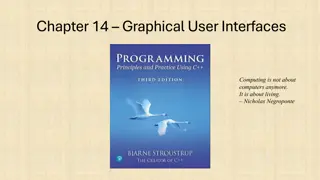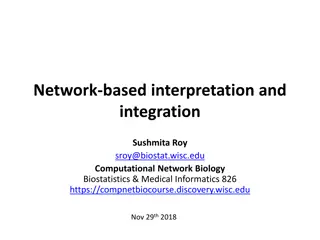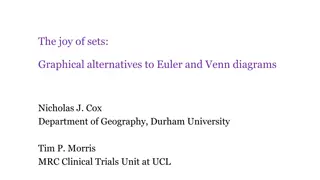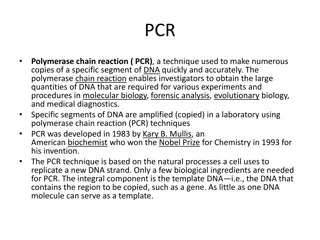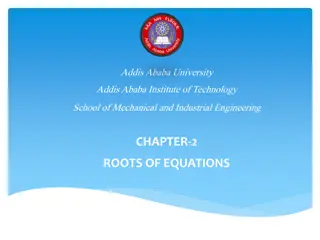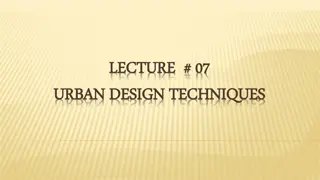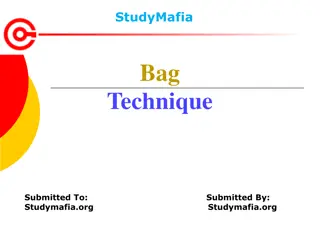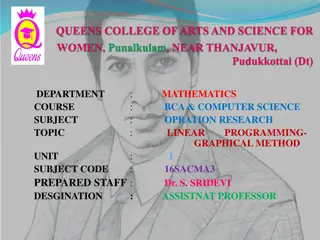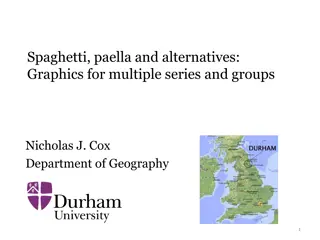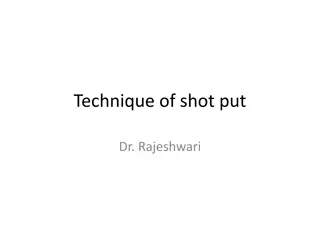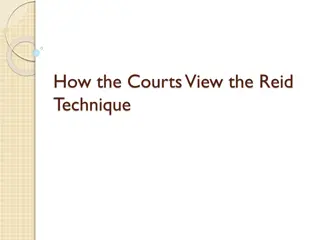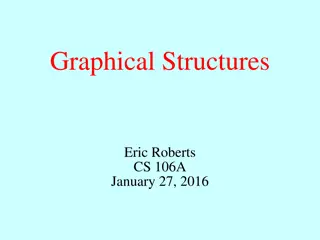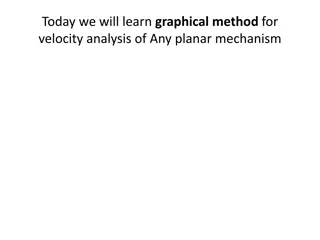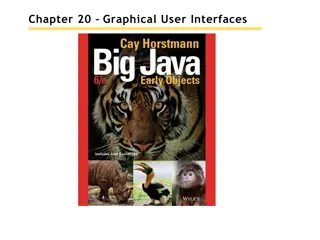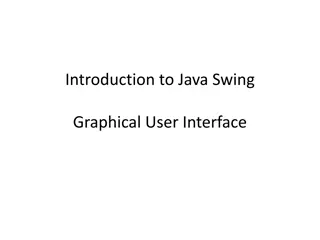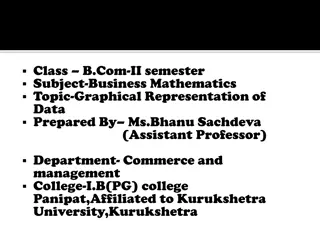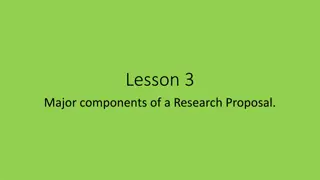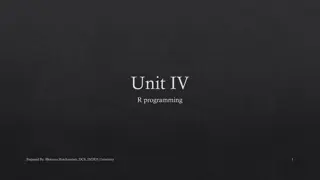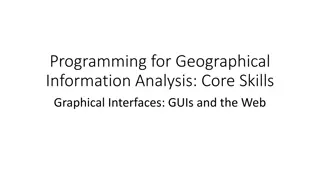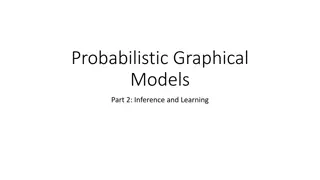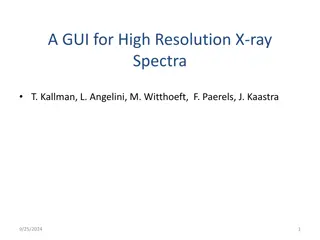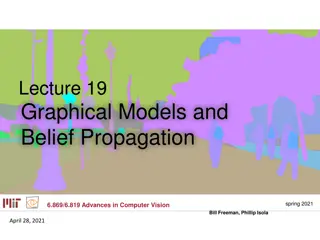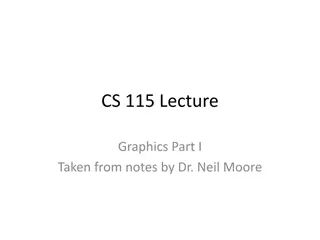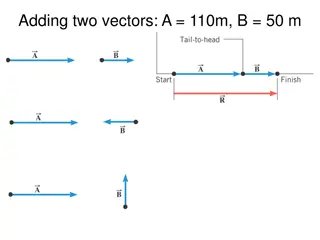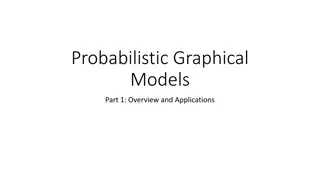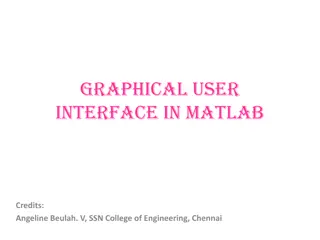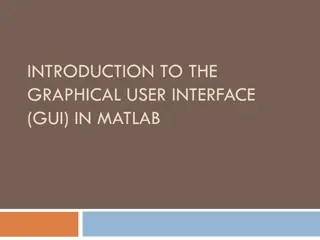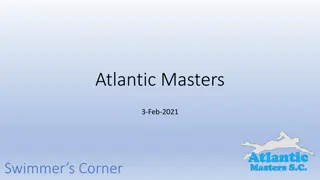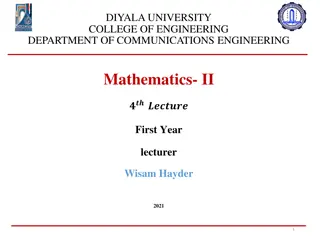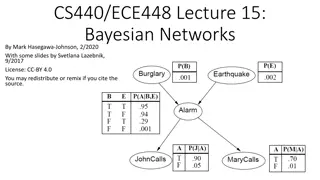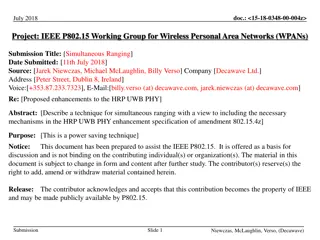Graphical representations of linear relationships
This material includes a series of checkpoint activities and additional tasks related to graphical representations of linear relationships for Year 8 students. Students will engage in tasks such as plotting points on coordinate grids, analyzing ant movements, exploring different rules for plotting p
1 views • 51 slides
The Evolution of Graphical User Interfaces in Computing
Graphical User Interfaces (GUIs) have transformed computing into a more user-friendly and interactive experience, emphasizing the shift from technology-focused to human-centric living. This chapter delves into the various aspects of GUIs, including I/O alternatives, common GUI tasks, programming per
1 views • 32 slides
Network Perturbations in Computational Biology
Network-based interpretation and integration play a crucial role in understanding genetic perturbations in biological systems. Perturbations in networks can affect nodes or edges, leading to valuable insights into gene function and phenotypic outcomes. Various algorithms, such as graph diffusion and
0 views • 55 slides
Introduction to Hanging Drop Technique in Microbiology
The hanging drop technique is a method used in microbiology to observe living microorganisms suspended in a fluid under a microscope. This technique allows for the examination of motility and morphology of bacteria, providing valuable information for research and analysis. By creating a wet mount us
0 views • 17 slides
Microbiology Study: Hanging Drop Technique in Department of Microbiology, College of Medicine
In the Department of Microbiology at the College of Medicine, the Hanging Drop Technique is utilized to study live microorganisms. This technique involves suspending microorganisms in fluid on a hollow ground slide, allowing for observation of their morphology under a microscope. By creating a wet m
1 views • 8 slides
Mastering the Long Jump Technique with Dr. Rajeshwari
The long jump, a combination of speed, technique, and precision, is more than just the jump itself. Dr. Rajeshwari explains the key elements such as setting up the approach, drive and transition phases, as well as the attack phase and final steps to excel in this track and field event. Learn from th
0 views • 10 slides
The Joy of Sets: Graphical Alternatives to Euler and Venn Diagrams
Graphical representations of set membership can be effectively portrayed using alternatives to traditional Euler and Venn diagrams. Learn about upset plots, indicating set membership graphically, and the use of Venn or Euler diagrams as solutions. Explore the historical context and challenges with V
3 views • 43 slides
PCR and Blot Techniques in Molecular Biology
Polymerase Chain Reaction (PCR) is a crucial technique for amplifying specific DNA segments rapidly and accurately. Developed in 1983, PCR is widely used in various fields such as molecular biology, forensics, evolution, and medical diagnostics. On the other hand, the Blot technique transfers DNA, R
0 views • 10 slides
Roots of Equations in Engineering: Methods and Techniques
Roots of equations are values of x where f(x) = 0. This chapter explores various techniques to find roots, such as graphical methods, bisection method, false position method, fixed-point iteration, Newton-Raphson method, and secant method. Graphical techniques provide rough estimates, while numerica
0 views • 13 slides
Utilizing Sterile Insect Technique for Aedes Aegypti Control
The Sterile Insect Technique (SIT) is a biologically-based method used to manage key insect pests by releasing sterile insects to decrease population reproduction. This technique, developed through genetic manipulation and ionizing radiation, has been instrumental in controlling insect populations l
0 views • 13 slides
Urban Design Techniques for City Improvement
Urban design techniques play a crucial role in urban improvement by providing concepts and tools for city building. Some of these techniques include the Open Space Technique, Transportation System Technique, Capital Network Technique, Public Policies Technique, Physical Design Technique, Plug-in Tec
4 views • 11 slides
Efficient Nursing Care with Bag Technique: Principles, Considerations, and Steps
Learn about the Bag Technique in nursing, a method utilizing a public health bag to perform procedures during home visits efficiently and effectively. Explore the principles, considerations, and steps involved in implementing this technique to minimize infection spread and ensure optimal patient car
0 views • 21 slides
Linear Programming - Graphical Method in Operations Research
This presentation explores the application of linear programming using the graphical method in the field of Operations Research. Dr. S. Sridevi, Assistant Professor, delves into the concepts and techniques involved in solving optimization problems through graphical representations. The slides cover
0 views • 24 slides
Strategies for Effective Data Visualization
This talk by Nicholas J. Cox explores strategies to enhance data visualization for better interpretation and comparison. From spaghetti plots to front-and-back plots, various techniques are discussed to improve the clarity and effectiveness of graphical presentations. The presentation emphasizes the
1 views • 47 slides
Shot Put Technique Overview
Shot put technique involves specific steps from holding the shot correctly to the final throwing position. It includes holding the shot at the base of the fingers, raising it above the head, positioning the body correctly, and executing the throw with a focus on using the legs and hips effectively f
0 views • 8 slides
The Courts' Perspective on the Reid Technique
The Courts' view on the Reid Technique emphasizes following established guidelines, avoiding coercion, and treating subjects with respect. They caution against making promises or threats, denying rights, or conducting excessively long interrogations. The core principles include conducting interviews
0 views • 89 slides
GPolygon Class in Graphical Structures
The GPolygon class in graphical structures is utilized to represent graphical objects bounded by line segments, such as polygons. This class allows for the creation of polygons with vertices connected by edges, utilizing methods like addVertex and addEdge to construct the shape. The reference point
0 views • 26 slides
Graphical Method for Velocity Analysis of Planar Mechanisms
Learn about the graphical method for velocity analysis of planar mechanisms through practice problems involving slider-crank mechanisms and link velocities. Understand how to calculate slider velocity, point velocity, and angular velocities using the given dimensions and rotational speeds. Visualize
0 views • 6 slides
Graphical User Interfaces in Java
Learn about designing graphical user interfaces in Java, including layout management, common components like radio buttons and menus, browsing Java documentation effectively, and utilizing inheritance for complex frames. Explore topics such as using layout managers to organize UI components, creatin
0 views • 74 slides
Java Swing for Building Graphical User Interfaces
Java Swing is a powerful framework for creating graphical user interface applications in Java. It provides a wide array of visual components such as JFrame, JComponent, and JPanel, enabling developers to build interactive and visually appealing applications easily. With Swing, developers can design
1 views • 25 slides
Graphical User Interfaces (GUIs) and JOptionPane in Java
Introduction to Object-Oriented Programming (OOP) and GUI concepts in Java, focusing on GUI hierarchy, designing GUIs, working with containers and components, utilizing JOptionPane for graphical input/output, and examples of showMessageDialog and showConfirmDialog in Java applications.
0 views • 90 slides
Insights into the Kato and Miura Thick Smear Technique
In 1954, Kato and Miura introduced the cellophane thick-smear technique for direct fecal sampling, revolutionizing helminthic infection detection. This method evolved into the Kato-Katz technique, providing advantages like precise egg quantification but facing challenges with hookworm egg visualizat
0 views • 19 slides
Impulse Excitation Technique for Monitoring Green Ceramics During Firing
The Impulse Excitation Technique (IET) is a nondestructive testing method employed to monitor the elastic properties of green ceramics as they undergo firing processes. This technique allows for the analysis of phase changes and material behavior at high temperatures, providing valuable insights int
0 views • 6 slides
Insights into Graphical Representation of Data in Business Mathematics
Graphical representation of data in Business Mathematics is a powerful tool that provides a bird's eye view of statistical information. It enables easy visualization of variations in variables, aiding in understanding time series and frequency distributions efficiently. While graphs offer quick esti
0 views • 18 slides
Innovative Weed Control Technique for Commercial Pineapple Cultivation
This research proposal focuses on developing a cost-effective technique to control weeds in commercial pineapple cultivations to improve yields and income for farmers. The introduction provides insights into the current status of pineapple cultivation in Sri Lanka, highlighting the challenges faced
0 views • 15 slides
Introduction to R Programming: Statistical & Graphical Methods
R is a programming language developed in 1993 by Ross Ihaka and Robert Gentleman. It offers a wide range of statistical and graphical methods, making it a powerful tool for data analysis and visualization.
0 views • 35 slides
Introduction to Graphical User Interfaces (GUIs) in Python for Geographical Information Analysis
This content provides insights into creating Graphical User Interfaces (GUIs) in Python for Geographical Information Analysis. It covers the basics of GUI development using TkInter and event-based programming with a focus on user experience design and functionality. The lecture emphasizes the import
0 views • 45 slides
Probabilistic Graphical Models Part 2: Inference and Learning
This segment delves into various types of inferences in probabilistic graphical models, including marginal inference, posterior inference, and maximum a posteriori inference. It also covers methods like variable elimination, belief propagation, and junction tree for exact inference, along with appro
0 views • 33 slides
Developing a Graphical User Interface for High-Resolution X-ray Spectra Analysis
High-resolution X-ray spectra analysis can be challenging due to the complex nature of the information contained within. This project aims to simplify the process by developing a user-friendly graphical interface that enables users to visualize, analyze, and interpret X-ray spectra data effectively.
0 views • 19 slides
Graphical Models and Belief Propagation in Computer Vision
Identical local evidence can lead to different interpretations in computer vision, highlighting the importance of propagating information effectively. Probabilistic graphical models serve as a powerful tool for this purpose, enabling the propagation of local information within an image. This lecture
0 views • 50 slides
Graphics Library for Enhanced User Interaction in Python
Explore the Zelle graphics library in Python for creating interactive graphical user interfaces. Learn about classes like GraphWin, Point, Line, Circle, Rectangle, Oval, Polygon, Text, Entry, and Image to enhance the visual appeal of your programs and engage users in a more intuitive manner. Utilize
0 views • 25 slides
Graphical Technique for Adding Vectors - Example of Total Displacement Calculation
Example illustrating the graphical technique for adding vectors to determine the total displacement of a person walking three different paths on a flat field. The person walks specific distances in various directions, and the total displacement is calculated using head-to-tail method.
0 views • 11 slides
Probabilistic Graphical Models in Real-world Applications
Probabilistic Graphical Models (PGMs) offer a powerful framework for modeling real-world uncertainties and complexities using probability distributions. By incorporating graph theory and probability theory, PGMs allow flexible representation of large sets of random variables with intricate relations
1 views • 30 slides
Introduction to Creating Graphical User Interfaces in MATLAB
Explore the world of creating Graphical User Interfaces (GUIs) in MATLAB with this informative guide. Learn how to design GUIs, program them to respond to user actions, and launch them effortlessly. Dive into essential topics such as GUI creation, component layout, and programming details, all witho
0 views • 40 slides
Introduction to Graphical User Interface (GUI) in MATLAB
A graphical user interface (GUI) allows users to interact with software using visual elements like menus, buttons, and icons, instead of text-based commands. In MATLAB, GUIs consist of two main files - an .m file for code and a .fig file for graphical elements. GUIs enable users to interact with MAT
0 views • 50 slides
Improve Your Swimming Technique with These Tips
Enhance your swimming technique with valuable tips from Atlantic Masters. Learn how to swim more efficiently and faster by adjusting your technique to fit your goals and flexibility. Explore techniques like Early Vertical Forearm, Full Stroke with No Early Exit, Breathing When and How, and overcomin
0 views • 8 slides
Graphical Solutions of Autonomous Equations in Mathematics II
Explore the graphical solutions of autonomous equations in Mathematics II taught by lecturer Wisam Hayder at Diyala University's College of Engineering. Learn about phase lines, equilibrium values, construction of graphical solutions, and sketching solution curves using phase lines. Dive into exampl
0 views • 34 slides
Bayesian Networks for Efficient Probabilistic Inference
Bayesian networks, also known as graphical models, provide a compact and efficient way to represent complex joint probability distributions involving hidden variables. By depicting conditional independence relationships between random variables in a graph, Bayesian networks facilitate Bayesian infer
0 views • 33 slides
Graphical Representations and Scale in Learning
Explore the similarities and differences of various graphical representations, apply scale in context, solve problems involving scale. Includes warm-up activities, launch on Mount Kosciuszko summit walk, and analyzing floor plans. Success criteria emphasize reading and problem-solving skills related
0 views • 9 slides
Enhancing HRP UWB PHY through Simultaneous Ranging Technique
This document discusses a power-saving technique known as simultaneous ranging, proposed for inclusion in the IEEE P802.15.4z standard amendment. The technique allows for efficient distance measurement in scenarios such as automotive applications by configuring multiple devices to respond simultaneo
0 views • 16 slides

